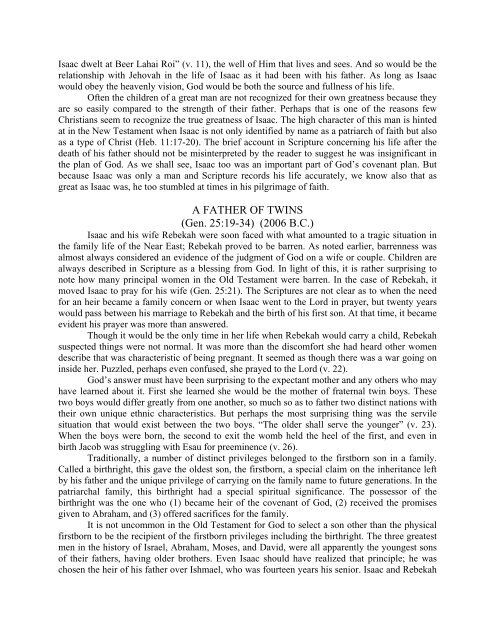A Journey Through The Old Testament - Elmer Towns
A Journey Through The Old Testament - Elmer Towns
A Journey Through The Old Testament - Elmer Towns
Create successful ePaper yourself
Turn your PDF publications into a flip-book with our unique Google optimized e-Paper software.
Isaac dwelt at Beer Lahai Roi” (v. 11), the well of Him that lives and sees. And so would be the<br />
relationship with Jehovah in the life of Isaac as it had been with his father. As long as Isaac<br />
would obey the heavenly vision, God would be both the source and fullness of his life.<br />
Often the children of a great man are not recognized for their own greatness because they<br />
are so easily compared to the strength of their father. Perhaps that is one of the reasons few<br />
Christians seem to recognize the true greatness of Isaac. <strong>The</strong> high character of this man is hinted<br />
at in the New <strong>Testament</strong> when Isaac is not only identified by name as a patriarch of faith but also<br />
as a type of Christ (Heb. 11:17-20). <strong>The</strong> brief account in Scripture concerning his life after the<br />
death of his father should not be misinterpreted by the reader to suggest he was insignificant in<br />
the plan of God. As we shall see, Isaac too was an important part of God’s covenant plan. But<br />
because Isaac was only a man and Scripture records his life accurately, we know also that as<br />
great as Isaac was, he too stumbled at times in his pilgrimage of faith.<br />
A FATHER OF TWINS<br />
(Gen. 25:19-34) (2006 B.C.)<br />
Isaac and his wife Rebekah were soon faced with what amounted to a tragic situation in<br />
the family life of the Near East; Rebekah proved to be barren. As noted earlier, barrenness was<br />
almost always considered an evidence of the judgment of God on a wife or couple. Children are<br />
always described in Scripture as a blessing from God. In light of this, it is rather surprising to<br />
note how many principal women in the <strong>Old</strong> <strong>Testament</strong> were barren. In the case of Rebekah, it<br />
moved Isaac to pray for his wife (Gen. 25:21). <strong>The</strong> Scriptures are not clear as to when the need<br />
for an heir became a family concern or when Isaac went to the Lord in prayer, but twenty years<br />
would pass between his marriage to Rebekah and the birth of his first son. At that time, it became<br />
evident his prayer was more than answered.<br />
Though it would be the only time in her life when Rebekah would carry a child, Rebekah<br />
suspected things were not normal. It was more than the discomfort she had heard other women<br />
describe that was characteristic of being pregnant. It seemed as though there was a war going on<br />
inside her. Puzzled, perhaps even confused, she prayed to the Lord (v. 22).<br />
God’s answer must have been surprising to the expectant mother and any others who may<br />
have learned about it. First she learned she would be the mother of fraternal twin boys. <strong>The</strong>se<br />
two boys would differ greatly from one another, so much so as to father two distinct nations with<br />
their own unique ethnic characteristics. But perhaps the most surprising thing was the servile<br />
situation that would exist between the two boys. “<strong>The</strong> older shall serve the younger” (v. 23).<br />
When the boys were born, the second to exit the womb held the heel of the first, and even in<br />
birth Jacob was struggling with Esau for preeminence (v. 26).<br />
Traditionally, a number of distinct privileges belonged to the firstborn son in a family.<br />
Called a birthright, this gave the oldest son, the firstborn, a special claim on the inheritance left<br />
by his father and the unique privilege of carrying on the family name to future generations. In the<br />
patriarchal family, this birthright had a special spiritual significance. <strong>The</strong> possessor of the<br />
birthright was the one who (1) became heir of the covenant of God, (2) received the promises<br />
given to Abraham, and (3) offered sacrifices for the family.<br />
It is not uncommon in the <strong>Old</strong> <strong>Testament</strong> for God to select a son other than the physical<br />
firstborn to be the recipient of the firstborn privileges including the birthright. <strong>The</strong> three greatest<br />
men in the history of Israel, Abraham, Moses, and David, were all apparently the youngest sons<br />
of their fathers, having older brothers. Even Isaac should have realized that principle; he was<br />
chosen the heir of his father over Ishmael, who was fourteen years his senior. Isaac and Rebekah

















